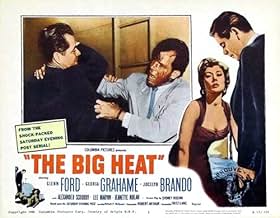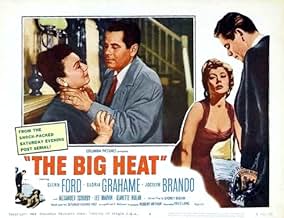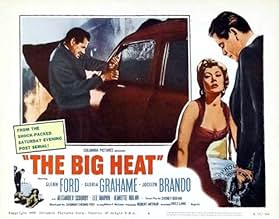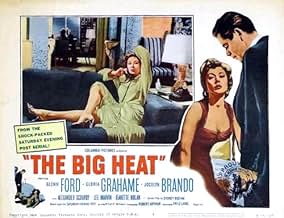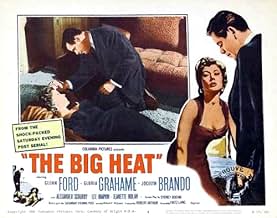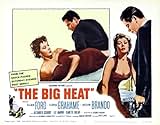NOTE IMDb
7,9/10
31 k
MA NOTE
Un policier à la peau dure, Dave Bannion s'attaque à un syndicat du crime puissant dans le milieu politique.Un policier à la peau dure, Dave Bannion s'attaque à un syndicat du crime puissant dans le milieu politique.Un policier à la peau dure, Dave Bannion s'attaque à un syndicat du crime puissant dans le milieu politique.
- Réalisation
- Scénario
- Casting principal
- Récompenses
- 2 victoires et 2 nominations au total
Avis à la une
A violent story about a detective working in a corrupt department who investigates the apparent suicide of a fellow officer. Worth seeing for Glenn Ford's prototypical performance and Gloria Grahme's show stealing portrayal of a boozing moll with a conscience. With facial disfigurement and cigarette burns it took violence up a notch from the standard gun play of the past, making it grimmer and more realistic, and giving the story more punch. Grahme's tough and tender role stands out and gives the film a tragic element, while certain of its portrayals of greed and corruption (namely the dead officer's wife) stand out for their attention to detail. In the end, it IS the details that give this formulaic story its clout, and we can thank director Fritz Lang for that.
This punchy little noir moves along at brisk clip. Glenn Ford simmers the whole time like a boiling kettle about to blow . This man has no pleasures that are obvious except his Westinghouse wife and child. Lee Marvin barely maintains control for much of the film. He is a catalogue of evil and greedy excess. Gloria Grahame is marvelous, witty, beautiful, bitter beyond hope. There is no redemption to be had for most of the characters in this sordid little universe. Conspiracy theorists of the 21st century will look back at the kind of simple-minded corrupt worldview espoused by Lang in this and other films and lament its loss. In THE BIG HEAT, evil and rot have names and faces and with enough fortitude, and the willingness to lose everything, they can be conquered. At least for a day. We know today that the whole infrastructure of power is poisoned beyond repair. The fifties held out a modicum of hope. Brief, fleeting hope. This is a violent film. Others have commented that much of the horror is committed off screen. But you can easily imagine it. Lang doesn't pull many punches here. The treadmill of denouement speeds up rapidly in the last few sections of the film. After viewing a film like THE BIG HEAT, I often want to wander down some dark street and find a corner diner, something like the one portrayed in Hoppers's NIGHTHAWKS, and have a cup of java, listen to some Brubeck on the jukebox, and wait for someone to come in from the chilly street . But the diners in my neighbourhood are either in the middle of the block or close early because of street crime. So I stay home, have a cup of tea, and dream noirish thoughts half asleep on my couch. This is a fine entry into the film noir lexicon.
This is a classic film noir, beautifully directed by Fritz Lang.. Fast paced non stop plot line & action... Glenn Ford is the good guy with some shades of gray/ Lee Marvin is the bad guy and boy is he bad ; roughs up 2 women/ Carolyn Jones at the bar, slams her hand/ and poor Gloria Grahame/ throws hot boiling coffee in her gorgeous face.. This is a very sadistic scene, and very memorable!!Gloria plays her part to the hilt.. one of her greatest screen moments...She made several film noire movies, In A Lonely Place/ Naked Alibi etc. won her Oscar for a serio comedy role in The Bad & The Beautiful/ sang "I Cant Say No" in Oklahoma.. and was almost crushed by an elephant in The Greatest Show On Earth.. she had a great career... and will always be my favorite 50's bombshell...this film is not to be missed/ Great support by Alex. Scourby, Jeanette Nolan and others.. not to be missed !
Fritz Lang can conjure up a paranoid thriller with the greatest of ease (actually, it's probably a lot of work, but it looks easy, which is a feat unto itself), and The Big Heat provides some of his classic paranoia to the proceedings of a story of a good, hard cop on the trail of a case that's gone way too corrupt. There are simple visual touches, amid what looks like a standard-shot thriller (when compared to, say, M, which is Godly in its vision of the darkness of humanity's layers peeled back). But it's got the kind of grit to it that most likely inspired Dirty Harry, even if, arguably, Glenn Ford isn't quite as great a star as Clint Eastwood. He's got a style to himself, anyway, like someone who is almost TOO good, and knows it, which is why he'll get the job done even if it means some busted knuckles and a few cracked heads. He's a compelling force as Dave Bannion, and he's perfectly cast against a bunch of sinister, slimy characters (save for the women, and even one of them is just rotten).
After a cop seems to have killed himself, the case looks open and shut. But there seems to be more for Bannion, as he didn't seem like a guy, from some accounts, to do himself in. Turns out there's a big cheese named Lagana who wants this put hush-hush like, and pays off the widow to keep a letter he wrote under wraps. But Bannion is suddenly put to the test, if only of himself, when his family is put in danger (with, of course, tragic results). Lang doesn't stop for a detail that isn't worthy of the attention of the narrative, and there's a connection that he makes between the world of the criminal underworld and the law: it's a place where there's some gray, but the black and white aspect rings through due to the situation at hand: corrupt cops, dirty criminals, and only a couple of dames to trust in the mix of it (one of them Debby, played in another great turn by Gloria Grahame, takes a savage incident with a pot of coffee via Lee Marvin's hand to wise up).
It might not have the depth of an M or Scarlett Street, but the Big Heat is about as solid a genre piece as one could ask for, getting more harrowing from the first gun shot of the picture all the way to the final moment when Bannion leaves the office for a hit-and-run case (a cop's work is never finished, one might suggest). It's also got more intelligence for its conventional roots with the little things; for example, there's a point in the movie where something pivotal could've happened with Bannion's daughter and the thugs, but Lang makes a good step to push aside it, keeping the focus squarely on the task at hand instead of sidestepping the climax into cliché. Land understands how, for the sake of a piece of pulp fiction like this, to keep the lines in order, even if it might seem standard for today: keep Bannion's family wholesome, maybe TOO wholesome, with stories of three little kittens, and keep the criminal elements savage, sinister in their grins and suits and violence brimming underneath.
One things for sure, it doesn't get much less thrilling than seeing Ford and Marvin in an unpredictable shoot-out. A+
After a cop seems to have killed himself, the case looks open and shut. But there seems to be more for Bannion, as he didn't seem like a guy, from some accounts, to do himself in. Turns out there's a big cheese named Lagana who wants this put hush-hush like, and pays off the widow to keep a letter he wrote under wraps. But Bannion is suddenly put to the test, if only of himself, when his family is put in danger (with, of course, tragic results). Lang doesn't stop for a detail that isn't worthy of the attention of the narrative, and there's a connection that he makes between the world of the criminal underworld and the law: it's a place where there's some gray, but the black and white aspect rings through due to the situation at hand: corrupt cops, dirty criminals, and only a couple of dames to trust in the mix of it (one of them Debby, played in another great turn by Gloria Grahame, takes a savage incident with a pot of coffee via Lee Marvin's hand to wise up).
It might not have the depth of an M or Scarlett Street, but the Big Heat is about as solid a genre piece as one could ask for, getting more harrowing from the first gun shot of the picture all the way to the final moment when Bannion leaves the office for a hit-and-run case (a cop's work is never finished, one might suggest). It's also got more intelligence for its conventional roots with the little things; for example, there's a point in the movie where something pivotal could've happened with Bannion's daughter and the thugs, but Lang makes a good step to push aside it, keeping the focus squarely on the task at hand instead of sidestepping the climax into cliché. Land understands how, for the sake of a piece of pulp fiction like this, to keep the lines in order, even if it might seem standard for today: keep Bannion's family wholesome, maybe TOO wholesome, with stories of three little kittens, and keep the criminal elements savage, sinister in their grins and suits and violence brimming underneath.
One things for sure, it doesn't get much less thrilling than seeing Ford and Marvin in an unpredictable shoot-out. A+
Effective film noir about a cop fighting the mob as well as his own corrupt superiors as he investigates a murder. Ford has perhaps the best role of his career as the good cop. His scenes with wife Brando are very nicely handled, adding poignancy to the tragedy that would befall the family. There are shades of Dirty Harry as Ford takes matters into his own hands. Marvin and Grahame are also good as a mobster and his moll, respectively. Lang, a master of this sort of film-making, keeps things moving at a snappy pace. Some of the violence is jarring but of course nothing graphic is shown, given the era the movie was made in. After an excellent start, the second half of the film becomes somewhat routine but it still packs a punch.
Le saviez-vous
- AnecdotesColumbia wanted to borrow Marilyn Monroe from 20th Century-Fox to play the role of Debby Marsh, but Fox's asking price was too high. Gloria Grahame was cast instead.
- GaffesThe street address for the junkyard on Bannion's list is "101", yet the number "1024" is seen on a large sign over the yard's shed.
- Citations
Debby Marsh: [to Bannion] Oh, well, you're about as romantic as a pair of handcuffs.
- ConnexionsFeatured in Mean Streets (1973)
- Bandes originalesIt's a Blue World
(uncredited)
Written by Chet Forrest and Bob Wright
Heard instrumentally during one of the scenes at The Retreat
Meilleurs choix
Connectez-vous pour évaluer et suivre la liste de favoris afin de recevoir des recommandations personnalisées
Détails
Box-office
- Montant brut mondial
- 7 083 $US
- Durée1 heure 29 minutes
- Couleur
- Rapport de forme
- 1.37 : 1
Contribuer à cette page
Suggérer une modification ou ajouter du contenu manquant

Lacune principale
What is the Japanese language plot outline for Règlement de comptes (1953)?
Répondre

